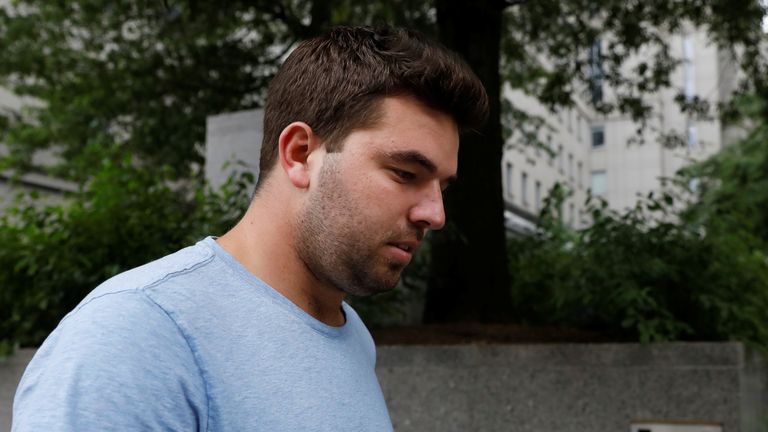Fraudster Billy McFarland spent almost four years in jail after his “luxury” Fyre Festival turned out to be the event from hell.
Guests paid thousands of dollars for what they thought would be a party for a young, elite crowd in the Bahamas.
But when they arrived, they found a much different reality.
Pictures of disaster relief tents, soggy food and stranded festival-goers quickly turned the event into a viral disaster, sparking several lawsuits and even a criminal investigation into McFarland.
The saga was documented in a much-watched Netflix series in 2019.

Emily Ratajkowski, Bella Hadid and Jasmine Tookes joined the promotional campaign
The festival had been promoted by supermodels including Bella Hadid, Kendall Jenner and Emily Ratajkowski, who later distanced themselves from the spectacle.
But now, it appears McFarland is back for another attempt with “Fyre Festival II”, to the surprise of many who watched the chaos unfold back in 2017.
We’ve taken a look back at what happened, and what followed.
Billy McFarland – entrepreneur turned conman
McFarland’s bid to be a successful entrepreneur started early, when he dropped out of college to launch the short-lived investment company Spling.
After that failed, he co-founded Magnises in 2013 – an “aspirational black card” membership club for millennials offering VIP access to exclusive events.
He even lived briefly with con artist Anna Delvey (Anna Sorokin), the subject of the Netflix series “Inventing Anna”, who reportedly stayed at the Magnises HQ townhouse with McFarland for several months.

Anna Delvey
McFarland first met Fyre Festival co-founder, the rapper Ja Rule, when booking him for a show.
The pair connected, and later co-founded Fyre Media – the company which created Fyre Festival.
Magnises was wound up after McFarland was arrested and charged over Fyre Festival in 2017.
Chaos, confusion and cheese sandwiches
At up to $100,000 per head, Fyre Festival customers had been promised white sand, luxury accommodation and first-class food.
But when they arrived they were instead faced with a rain-sodden “disaster tent city”.
Seth Crossno – who live-tweeted the situation under the pseudonym William Needham Finley IV and featured in a documentary about the disastrous event – said there was “mass chaos”.
There were reports of luggage going missing or being dumped out of a shipping container in the dark.
This content is provided by Twitter, which may be using cookies and other technologies.
To show you this content, we need your permission to use cookies.
You can use the buttons below to amend your preferences to enable Twitter cookies or to allow those cookies just once.
You can change your settings at any time via the Privacy Options.
Unfortunately we have been unable to verify if you have consented to Twitter cookies.
To view this content you can use the button below to allow Twitter cookies for this session only.
Mattresses were pictured piled up on the floor, and some people reportedly fought over access to the limited number of tents.
There were also issues with access to water, and instead of gourmet meals, stranded festival-goers were provided with limp cheese sandwiches in Styrofoam boxes, a photo of which went viral on social media at the time.
This content is provided by Twitter, which may be using cookies and other technologies.
To show you this content, we need your permission to use cookies.
You can use the buttons below to amend your preferences to enable Twitter cookies or to allow those cookies just once.
You can change your settings at any time via the Privacy Options.
Unfortunately we have been unable to verify if you have consented to Twitter cookies.
To view this content you can use the button below to allow Twitter cookies for this session only.
Many businesses lost money due to the debacle.
One Bahamian restaurant owner, Maryann Rolle, told Netflix she spent $50,000 of her savings on providing catering for workers in the weeks leading up to the festival, and received no compensation.
A GoFundMe campaign for Rolle after the event raised over $100,000.
Read more from Sky News:
Music mogul dumped by two more stars
Jailed crypto boss denied vegan food in prison
Legal action over ‘post-apocalyptic nightmare’
McFarland and co-organiser Ja Rule, who tweeted at the time insisting the events were “not my fault”, were hit with a number of lawsuits over the botched festival.
Legal documents from representatives for one guest, who was seeking $100m in compensation, said guests were lured into “a complete disaster, mass chaos and a post-apocalyptic nightmare”.
Most lawsuits alleged fraud, negligence and breach of contract.
This content is provided by Twitter, which may be using cookies and other technologies.
To show you this content, we need your permission to use cookies.
You can use the buttons below to amend your preferences to enable Twitter cookies or to allow those cookies just once.
You can change your settings at any time via the Privacy Options.
Unfortunately we have been unable to verify if you have consented to Twitter cookies.
To view this content you can use the button below to allow Twitter cookies for this session only.
Ja Rule was later cleared of wrongdoing in the $100m lawsuit. He even claimed he had also been defrauded by McFarland.
Seth Crossno and co-claimant Mark Thompson were awarded $5m in damages for their lawsuit in 2018.
Organisers settled a separate case with 277 other ticket holders in 2021 – though their payouts were reported to be much smaller.
Criminal case against Billy McFarland
In July 2017, McFarland was arrested in New York accused of seeking to swindle investors over the disaster.
He later pleaded guilty to wire fraud charges relating to the festival and various fraud charges stemming from a separate ticket-selling scam.

Billy McFarland
McFarland, then 26, was sentenced to six years in prison. He was released last year after serving nearly four years of his sentence.
He apologised for his crimes and told a judge he had intended to organise a “legitimate festival” but “grossly underestimated the resources that would be necessary to hold an event of this magnitude”.
A “fear of letting everybody down” drove him to make mistakes, he said during his sentencing.
“I made decisions that were a slap in the face to everything my family tried to teach me,” McFarland said in court.







